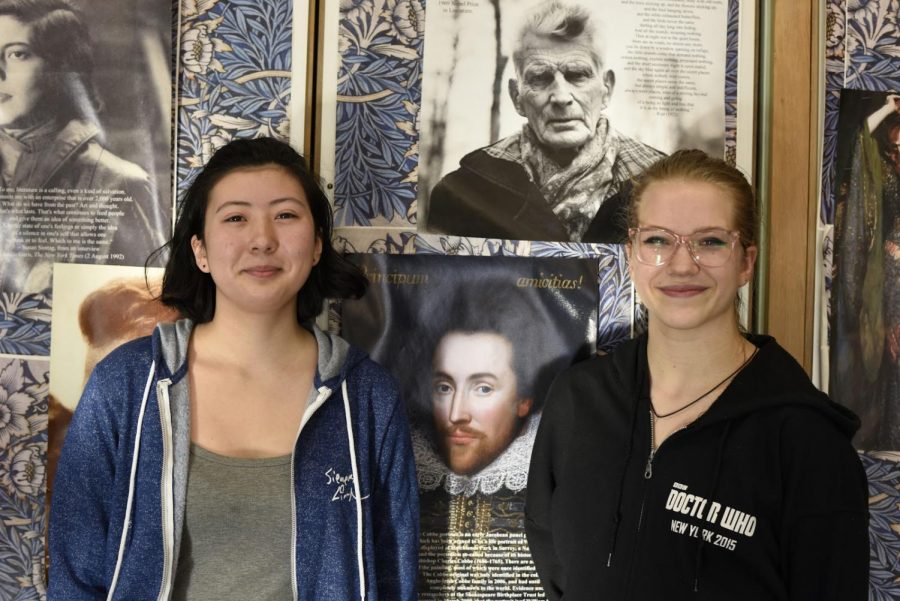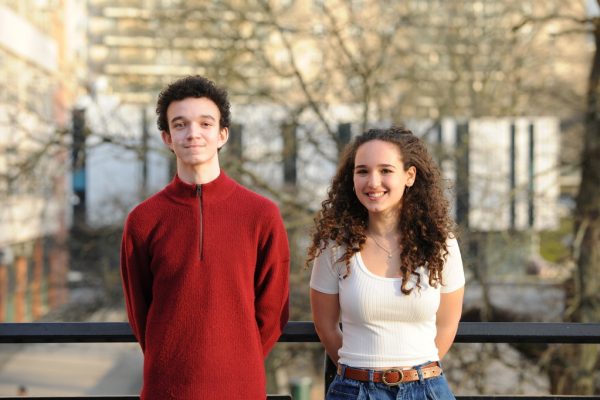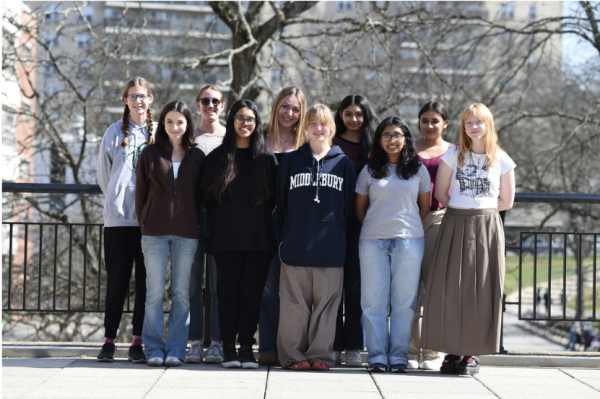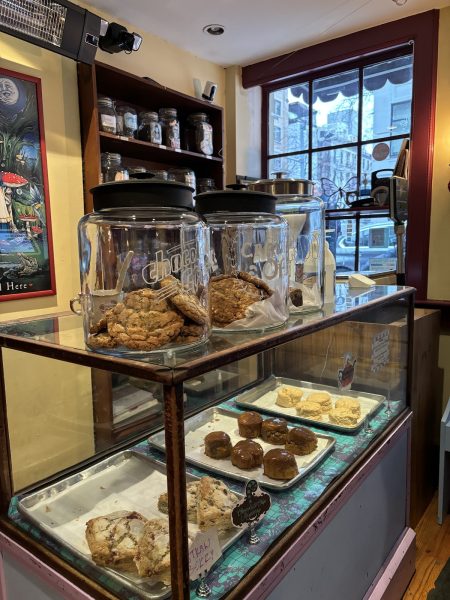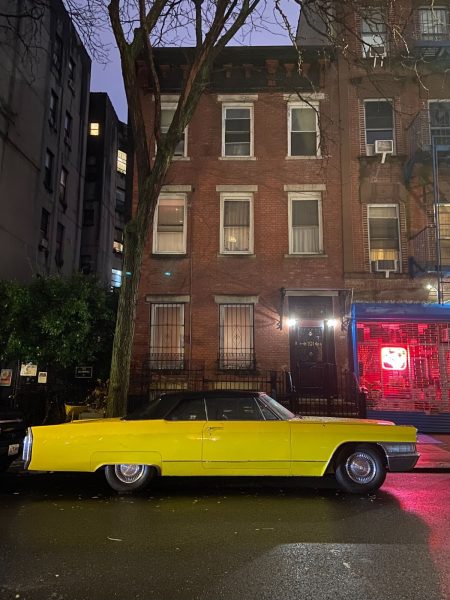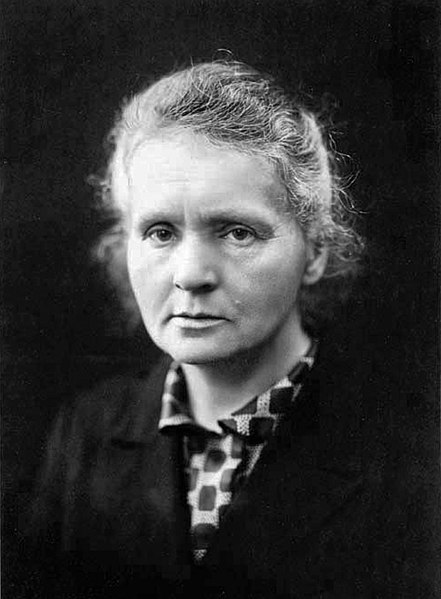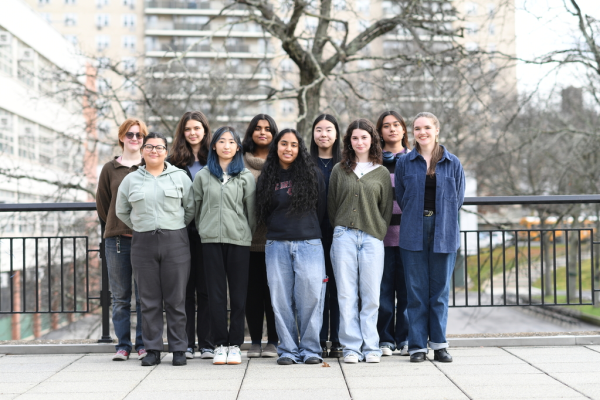Jing Mae ’20 Wins Second Place in the NYC Shakespeare Competition Finals For the First Time in Bronx Science History
Jing Mae Wang ’20 (winner, on left) and Sepncer McQuaig ’20 (runner up, on right), stand in front of a print of the newly discovered Cobbe portrait of William Shakespeare.
With a selection of over 250 monologues from 38 plays to choose from, The English-Speaking Union, a non-profit educational charity, held the 36th annual ESU National Shakespeare Competition to rally talented performers to compete.
Since February 14th, 2019, students have been preparing their soliloquies in an effort to advance to nationals and win a scholarship and airfare to attend the Royal Academy of Dramatic Art Young Actors’ Summer School. This year, on Feb 14th, 2019, a handful of students tried their hand at Bronx Science’s local competition. Of all the competitors, Jing Mae Wang ’20 rose to the top and advanced to the semi-finals at the main branch of the English Speaking Union in midtown Manhattan.
“I saw this as an opportunity to show off my acting as well as my love for Shakespeare,” Spencer McQuaig ’20 said.
Having been the runner up in the 35th annual ESU National Shakespeare Competition last year, Wang chose to perform Beatrice’s soliloquy from ‘Much Ado About Nothing,’ Act 4, Scene 1, lines 315-338. “The monologue really spoke to me when I first read it. Beatrice was this outspoken and assertive woman who had just witnessed her cousin being publicly shamed by her fiance at her own wedding [and] immediately leading up to this rant, this man, who was friends with the fiance, confesses his love for her. And, as any rational woman would do, she asks him to murder the fiance,” said Wang. Her accurate display of confusion, anger, and disappointment in this scene drew in the audience and brought them back to a Shakespearean theater. Wang had actually been feeling sick that day, but pushed aside her discomfort in order to participate in this year’s competition. “I spent the entire night before feeling sick, but I’ve been looking forward to it ever since last year,” said Wang.
Through another brilliant performance at the semi-finals, Wang advanced with three other students: Jordan Griffin (Talent Unlimited High Schools), Adam Kaplan (The Packer Collegiate Institute), and Nachshoni Rothenberg (Yeshiva University High School for Boys). At the New York City Finals at the Morgan Library and Museum, Wang ranked second among the top three, just behind Graana Khan (United Nations International School) who advanced to nationals, along with Ndeye Niang (Repertory Company HS for Theatre Arts) who ranked third.
Runner up of the Bronx Science competition, Spencer McQuaig ’20, performed as Desdemona from ‘Othello,’ Act 4, Scene 2, lines 175-193. “It is an extremely emotional piece – Desdemona is confused and doesn’t understand why Othello has pulled away from her in the way that he did. I saw this as an opportunity to show off my acting as well as my love for Shakespeare,” McQuaig said. One can imagine the difficulty in trying to express Desdemona’s web of emotions, after being verbally abused by her own husband, as a teenager. This, in addition to the difficulty that comes with adjusting to a character’s role, is necessary in order to fully experience that moment in context.
This year, the overall pool of participants was significantly smaller compared to previous years. This could be due to the retirement of the drama teacher, Mr. Brown, who had previously required his drama students to participate in the competition as a class assignment. Nevertheless, the overall quality of the performances were also better than that of previous years, considering that the pool of participants consisted of only students who chose to participate of their own accord, meaning they were all personally motivated to win. “I love Shakespeare, and memorizing and performing pieces gives me so much joy,” said Ava Vercesi ’19, who won first place last year in the 35th Shakespeare competition, and second in the 34th. “My favorite aspect was the preparation. With Shakespeare, there is an added element of needing to translate the words into terms that I understand.”
Similar to the experience of learning a new language, Shakespearean plays can take readers and listeners to another time, a different society with different social norms and behaviors that can only be accurately portrayed with a thorough understanding of the scene, the nature of the character, and the emotions and thoughts that might be running through the character’s head at that moment.
Tiffany Chen is the Managing Editor/Advisory Editor for ‘The Science Survey’ and a Groups Section Staff Reporter for ‘The Observatory.’ Her role...

